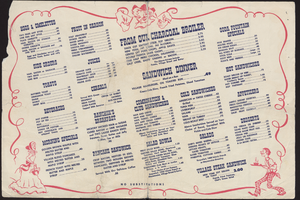Search the Special Collections and Archives Portal
Search Results
San Pedro, Los Angeles & Salt Lake Railroad Company Records
Identifier
Abstract
The collection is comprised of records of the San Pedro, Los Angeles & Salt Lake Railroad Company (1901-1976). The construction of this railroad led to the founding of Las Vegas, Nevada and the creation of the Empire Construction Company and Las Vegas Land and Water Company. The records document the company's operations and include correspondence and contracts relating to lots in the Las Vegas townsite, payments and accounts, invoices and other audit materials from 1905 to 1923. The collection also includes the records of the railroad agent at Arden Station, located ten miles south of the Las Vegas Station, which contain correspondence, ledgers, freight and way bills, shipping orders, and telegrams.
Archival Collection
Jean Ford Photograph Collection
Identifier
Abstract
The Jean Ford Photograph Collection (1964-1977) contains black-and-white photographic prints, contact sheets, and transparencies of Nevada politician and activist Jean Ford. The collection includes photographs of Jean Ford with the Nevada State Park Commission and various Nevadan politicians; Ford lecturing and campaigning; and of the 1977 National Women's Conference in Houston, Texas.
Archival Collection
Vassili Sulich Photographs
Identifier
Abstract
The Vassili Sulich Photographs depict dancer and choreographer Vassili Sulich from 1950 to 2011. The photographs primarily depict Sulich dancing in ballets in France, Croatia, Germany, England, and the United States. The photographs also depict ballets choreographed or directed by Sulich at the Nevada Dance Theatre, which he founded in 1972 in Las Vegas, Nevada.
Archival Collection
Joshua Abbey Papers
Identifier
Abstract
Collection is comprised primarily of files from approximately the early 1980s to 2017 detailing Joshua Abbey's theater and film career; his involvement with environmental efforts in Southern Nevada such as the Citizens Against Nuclear Waste in Nevada (CANWIN); and his involvement with the Jewish community in Las Vegas, including the Jewish Film Festival, the Jewish Federation, Temple Beth Sholom, and other organizations. The collection also includes information about the Jewish Community Center from the 1950s and a file on the film production of
Archival Collection
Dorothy Dorothy Papers
Identifier
Abstract
The Dorothy Dorothy papers (approximately 1913-1986) document the life of singer, songwriter, columnist, pilot, and farmer, Dorothy Dorothy. Materials contain genealogy records, correspondence, business and organizational records, local history, sheet music, artifacts, and two boxes of photographic prints. Also included are materials relating to her active involvement with animal rights campaigns.
Archival Collection
Henry and Anita Schuster Papers
Identifier
Abstract
Collection is comprised of correspondence, speeches, essays, meeting minutes, photographs, research materials, publications, press clippings, awards, and event programs (1941-2011) that document the life of Henry Schuster, and his work with his wife Anita. Materials are mainly related to the Holocaust and to Holocaust memory and survivor organizations (especially the Holocaust Survivor's Group of Southern Nevada, which the couple founded, and L’Œuvre de Secours aux Enfants). Genealogical information is also included, as well as records of Henry Schuster’s time in the U.S. Army and his studies at the Manhattan Technical Institute.
Archival Collection
Bill Schafer Papers
Identifier
Abstract
The Bill Schafer Papers (1980-2018) contain personal and professional papers of Las Vegas, Nevada journalist and publisher, Bill Schafer, and photographs from various LGBTQIA+ related events in Las Vegas. The materials include files related to Schafer's work managing the
Archival Collection
John Levy Lighting Productions, Inc. Records
Identifier
Abstract
The John Levy Lighting Productions, Inc. Records (approximately 1990-2022) contain correspondence, invoices, contracts, expense reports, newspaper and magazine clippings, photographs, slides, and digital files detailing the development of various projects primarily in Las Vegas, Nevada. The records also contain architectural lighting drawings, electrical schematics and design details, conceptual sketches, and artist renderings of projects in Las Vegas, throughout United States, and various international locations.
Archival Collection
Wilbur and Toni Clark Papers
Identifier
Abstract
The Wilbur and Toni Clark Papers date from 1944 to 1991, with the bulk from 1953 to 1963 and document the lives of Wilbur and Toni Clark in Las Vegas, Nevada and the development of the Desert Inn Hotel and Casino. The collection includes correspondence from Wilbur Clark to those he identified as important individuals including government officials and celebrities. It also includes materials related to Clark’s plan of building luxury apartments near the Desert Inn, and newspaper clippings and scrapbooks about the Clarks and the Desert Inn. The collection contains some audiovisual materials including Wilbur and Toni Clark's home movies, news footage, and film footage of Las Vegas, Nevada and the Desert Inn.
Archival Collection

